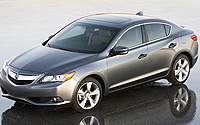automotive
Higher Transaction Prices, Lower Incentives In Feb.
- by Karl Greenberg , March 5, 2013
 All things being equal in the auto business,
transaction prices and incentives ride a seesaw together. When one is up, the other is down, because the former is dragged down by the latter. But all things are rarely equal.
All things being equal in the auto business,
transaction prices and incentives ride a seesaw together. When one is up, the other is down, because the former is dragged down by the latter. But all things are rarely equal.
An automaker's average transaction prices -- what people are actually paying for new vehicles -- depend on which vehicles they buy, and how many features they load them with before rolling off the lot. Average incentives are static. They are pretty much what they are for a model, regardless of which trim level of the car people buy, although there can be some adjustments.
Well, the good news for the industry is that average transaction prices last month versus last February are up a bit -- 1.2% -- to an average new-vehicle price of $30,958, according to research and online consumer auto marketing firm TrueCar.com. And incentive spend is down 4% -- meaning that industry-wide, automakers are putting less cash in the driver's seat to move vehicles off the lot.
advertisement
advertisement
Toyota, which spent last year getting its pace back after big force majeur issues and a PR headwind or two, saw transaction prices increase almost 6% versus Feb. 2012.
While Honda got a 3.3% improvement in transaction pricing, its incentive spend increased nearly 40% for the month, per the firm.
Jesse Toprak, head of industry analysis at TrueCar, says Honda is a good case study of how incentives are not necessarily strictly related. "Even if they increase incentive spend, if consumers buy more expensive Hondas, or more expensive trim levels, transaction price is rising," he says. "We saw a trend since the recession where consumers are buying increasingly expensive trim levels of models, even as smaller [less expensive] cars are grabbing larger share of the market." He points out that part of this has been a post-recessionary trend of consumers downgrading from larger vehicles, but wanting the same features they used to have. "They don't want to give up the amenities they are used to."
He adds that Honda's incentive spend went up on a percentage basis because the numbers were so low last February due to pent-up demand after the Tsunami and floods in Thailand put a bottleneck on production.
Per TrueCar, the Hyundai/Kia pair saw transactions rise nearly 5%. Volkswagen was up by 2% and Ford, the only domestic to see a positive transaction delta, saw a 3.6% increase. GM and Chrysler saw transaction prices drop 0.3% and 2.9% respectively, meaning that they were having to spend less to get cars sold, but that consumers are spending probably not buying as expensive a Chrysler Group vehicle as they were.
Chrysler's average transaction price last month was $28,614, and incentive spend dropped by 1.3%.




